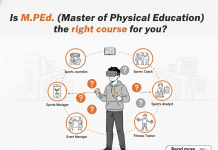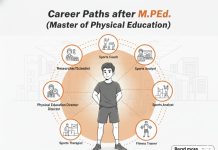- Why M.A. (Journalism & Mass Communication) Opens Advanced Career Opportunities?
- What Is M.A. (Journalism and Mass Communication)?
- Who Should Pursue M.A. in Journalism and Mass Communication?
- Advanced Skills You’ll Gain in M.A. (JMC)
- Career Paths in Print & Digital Journalism (Reporters, Editors, Columnists)
- Advanced Careers in Broadcast Media (Anchors, Producers, News Directors)
- Opportunities in Public Relations, Corporate Communication & Branding
- Careers in Advertising, Media Planning & Content Strategy
- Research, Teaching & Academic Careers after M.A.
- Freelancing, Independent Content Creation & Entrepreneurship
- International Opportunities & Collaborations
- Conclusion
- Frequently Asked Questions (FAQs)
Why M.A. (Journalism & Mass Communication) Opens Advanced Career Opportunities?
In today’s information-driven society, the demand for well-trained professionals in journalism, media, and communication has skyrocketed. The career opportunities M.A. Journalism and Mass Communication graduates enjoy extending far beyond traditional reporting or news writing. From digital content creation and broadcast journalism to corporate communication, branding, and international collaborations, this postgraduate degree paves the way for highly specialized and advanced careers in Journalism and Mass Communication.
At Lovely Professional University (LPU), the M.A. JMC programme is carefully crafted to meet industry needs. Academic theory is combined with practical instruction in public relations, advertising, digital storytelling, media production, reporting, editing, and international communication tactics. Students are equipped to succeed in cutthroat media environments thanks to state-of-the-art studios, solid industry relationships, and a wide range of internship options.
What makes this programme even more relevant is the rapid transformation of the global media ecosystem. Opportunities that weren’t there ten years ago have been made possible by the emergence of digital first journalism, OTT platforms, influencer-driven campaigns, and AI-powered content production. Organisations require experts who are not only adept communicators but also capable of strategic thinking, moral decision-making, and creative narrative in order to preserve transparency, credibility, and audience engagement. Pursuing an M.A. in JMC from LPU equips students with this competitive edge, ensuring they stay ahead in a constantly evolving media environment.
| Did You Know?
According to a recent FICCI-EY Media & Entertainment Report, the Indian media industry is expected to reach ₹2.83 trillion by 2027, opening thousands of job opportunities for M.A. JMC graduates. |
What Is M.A. (Journalism and Mass Communication)?
The M.A. Journalism and Mass Communication overview highlights it as a two-year postgraduate programme designed to provide an in-depth understanding of modern media ecosystems. This degree emphasises advanced skills, research, critical thinking, and leadership roles in media organisations, in contrast to undergraduate JMC courses. Students are prepared to analyse trends, comprehend audience psychology, and develop communication strategies that influence public opinion and brand identification in addition to being trained to report news and produce content.
At LPU, the M.A. JMC programme details include:
- Advanced media theories, ethics, and communication models.
- Specialized training in print, broadcast, and digital journalism.
- Hands-on exposure through internships, workshops, and live projects.
- Modules on public relations, advertising, branding, corporate communication, and international media.
This postgraduate JMC course not only strengthens core journalistic abilities but also enhances students’ analytical and managerial skills, preparing them for leadership positions in diverse media-related industries.
The programme’s interdisciplinary approach is what sets it apart. Students get the chance to investigate related subjects like digital marketing, global media networks, political communication, and development communication. They obtain a comprehensive understanding of how media affects politics, economics, business, and culture by working on case studies, industry projects, and real-time newsroom simulations. This kind of training guarantees that graduates are not only prepared for the workforce but also have the ability to innovate and effect change in a communication environment that is always changing.
Who Should Pursue M.A. in Journalism and Mass Communication?
This dynamic field is not for everyone. A graduate degree in any field, ideally in journalism, mass communication, English, or the social sciences, is required to be eligible for the M.A. in journalism and mass communication. This guarantees that students already possess a solid academic background and the capacity to understand sophisticated media ideas and practices.
The ideal candidates for JMC at LPU are those who:
- Possess excellent communication, writing, or storytelling skills.
- Are curious about politics, culture, technology, and global affairs.
- Have a passion for journalism, creative media, or corporate communication.
- Aspire to build careers in PR, advertising, digital media, or teaching.
So, if you’re asking who should study M.A. JMC, the answer is: students who are creative, analytical, and eager to make an impact through mass communication platforms.
Additionally, this programme is a perfect fit for graduates who want to move beyond surface-level reporting and step into leadership roles in media organizations, policy think tanks, or corporate communication teams. It suits those who envision themselves influencing public opinion, building media strategies, or conducting impactful research in communication. Whether you aim to be a newsroom leader, a media entrepreneur, or an academic scholar, pursuing M.A. Journalism and Mass Communication at LPU gives you the platform to channel your curiosity, creativity, and critical thinking into a rewarding professional journey.
| Did You Know?
Over 80% of media companies worldwide are now actively hiring professionals with advanced degrees in journalism and communication to lead their digital transformation. |
Advanced Skills You’ll Gain in M.A. (JMC)
One of the biggest advantages of pursuing this degree is the diverse skills M.A. Journalism and Mass Communication graduates acquire. At LPU, the M.A. JMC expertise goes beyond traditional classroom learning and is designed to prepare students for the dynamic and ever-changing media industry. Students graduate with both technical and soft abilities that are highly sought after in a variety of employment fields.
Students develop a wide range of skills in M.A. Journalism and Mass Communication, including:
Media Production Competencies – Practical experience in digital publishing, editing, news anchoring, camera operation, and scriptwriting. Graduates with these technical skills can operate with confidence in digital platforms, multimedia production companies, radio, and television.
Research & Analysis – Proficiency in survey administration, audience insight interpretation, trend analysis, and academic and industry-focused media research. With the help of this sophisticated skill set, students can contribute to the creation of knowledge in communication studies and develop content strategies that are supported by evidence.
Strategic Communication – Proficiency in advertising tactics, branding initiatives, PR efforts, and persuasive messages. This gives students the know-how to handle public relations, improve a company’s reputation, and create efficient communication plans for businesses.
Digital Skills – Students gain advanced digital skills in today’s tech-driven environment, including multimedia storytelling, social media analytics, content strategy, and SEO optimization. For jobs in influencer marketing, online advertising, digital journalism, and data-driven communication, this prepares students for the workforce.
Leadership Skills – The advanced competencies in Journalism and Mass Communication also extends to managerial roles, including editorial decision-making, newsroom management, and leadership in corporate communication teams. Graduates are trained to step into supervisory and leadership positions with confidence.
The ability to move seamlessly into a variety of high-level positions in journalism, public relations, advertising, digital media, academia, and even media-related entrepreneurship is ultimately made possible by these advanced competencies in mass communication and journalism.
Career Paths in Print & Digital Journalism (Reporters, Editors, Columnists)
Even if the digital revolution has changed traditional journalism, it is still a thriving industry that offers graduates of the M.A. programme in journalism and mass communication intriguing careers in print and digital media. With a strong foundation in reporting, editing, and column writing through the LPU curriculum, students are well-prepared to take up high-level JMC jobs across both established media houses and emerging digital platforms.
Popular Roles in Print & Digital Journalism include:
- Reporters/Journalists – Covering a wide range of topics, including entertainment, politics, business, crime, the environment, health, and lifestyle.
- Editors – Overseeing the flow of content, managing newsroom operations, fact-checking, and guaranteeing quality and credibility across publications
- Columnists/Opinion Writers – Providing specialized perspectives, in-depth analysis, and thought-provoking commentary on current affairs, economy, social issues, and global trends.
- Digital Journalists – Learning SEO, digital publishing tools, and social media tactics while developing blogs, multimedia stories, online reports, and interactive features.
- Photojournalists & Video Journalists – Capturing events visually through impactful photography and video reports, vital for both traditional print and modern online journalism.
- Investigative Journalists – Conducting deep, fact-based research and unveiling hidden truths in politics, corporate affairs, or social justice issues.
- Data Journalists – Using statistics, data visualization, and analytics to create stories backed by hard evidence, especially in sectors like finance, health, and governance.
- Copy Editors & Proofreaders – Ensuring linguistic accuracy, flow, and precision in both print and online publications, making content reader-friendly and credible.
- Multimedia Content Creators – Combining text, video, graphics, and interactive elements to engage audiences on digital-first platforms.
Students learn digital production techniques, editorial simulations, and practical newsroom experience through the LPU reporting, editing, and column writing curriculum. This prepares them for high-level JMC jobs in leading national media houses like The Hindu, Hindustan Times, NDTV Digital, and international outlets such as BBC, Reuters, and The Guardian.
| Did You Know?
India has the world’s largest newspaper market, with over 100,000 registered publications, making print and digital journalism careers highly diverse and promising. |
Advanced Careers in Broadcast Media (Anchors, Producers, News Directors)
The broadcast media jobs that Journalism and Mass Communication graduates undertake are especially fulfilling for people who are drawn to the camera and studio setting. The field offers stimulating positions that combine leadership, creativity, and presentation.
Possible roles include:
- News Anchors – Presenting national and international bulletins with confidence and credibility.
- Producers – Coordinating shows, programmes, or documentaries, ensuring smooth execution.
- News Directors – Leading editorial teams in television and radio, making crucial decisions on content and presentation.
- Field Correspondents – Reporting live from the ground on breaking news, political events, or cultural developments.
- programme Hosts/Interviewers – Engaging audiences through talk shows, debates, and interactive programmes.
- Broadcast Content Strategists – Designing content for cross-platform audiences, including TV, radio, OTT, and podcasts.
Students who complete LPU’s anchor, producer, and news director training gain experience in production management, editorial decision-making, and on-camera capabilities. They may succeed in cutting-edge industries like podcasting, OTT-based journalism, and digital broadcasting thanks to their comprehensive training, which also prepares them to assume leadership positions in television media.
| Did You Know?
Podcasting and OTT platforms in India are growing at over 20% annually, creating new avenues for media professionals trained in anchor, producer, and news director roles. |
Opportunities in Public Relations, Corporate Communication & Branding
Businesses, governments, non-governmental organisations, and startups need more and more qualified people in today’s connected world to manage their brand image, communicate strategically, deal with crises, and interact with a variety of audiences on a variety of platforms.
LPU prepares students for corporate communication jobs across public relations, internal communications, branding, and corporate strategy. Students who have a solid foundation in audience engagement, media ethics, narrative, and digital communication tools are prepared to succeed in fast-paced work settings.
Key Career Opportunities in PR, Corporate Communication & Branding:
| Role | Responsibilities | Potential Employers |
| PR Specialists | Crafting press releases, media kits, and managing media relations | Media agencies, Corporates, Government PR Departments |
| Corporate Communication Executives | Managing internal communication, employee engagement, brand messaging | MNCs, Consulting Firms, Startups |
| Brand Managers | Designing and implementing long-term brand strategies, monitoring market presence | FMCG, Tech Companies, Global Brands |
| Crisis Communication Managers | Handling corporate crises, preparing communication strategies, protecting brand reputation | Corporates, NGOs, PR Consultancies |
| Content Strategists | Creating multi-platform campaigns, social media engagement, storytelling for brand building | Digital Agencies, OTT Platforms, Media Houses |
| Event & Media Managers | Organizing press conferences, launches, and promotional campaigns | Corporates, Government Agencies, Event Management Firms |
The branding opportunities JMC graduates gain are extensive, enabling them to work with top global companies, PR agencies, consulting firms, and international organizations. From designing campaigns that resonate with audiences to managing high-stakes corporate messaging, graduates step into roles where creativity meets strategy.
Careers in Advertising, Media Planning & Content Strategy
Pursuing a job in advertising media with an M.A. in Journalism and Mass Communication may be the best option if you possess both creativity and analytical skills. This area helps brands establish meaningful connections with audiences by fusing creativity and strategy.
Key job options:
- Advertising Executives – Campaign creation, execution, and client servicing.
- Media Planners – Strategizing ad placements across TV, digital, and print to maximize reach and ROI.
- Content Strategists – Designing narratives and storytelling frameworks for brands across platforms.
- Copywriters & Creative Directors – Crafting persuasive messages and leading creative campaigns.
- Digital Marketing Managers – Overseeing online campaigns, SEO/SEM strategies, and social media ads.
- Brand Managers – Building long-term brand identity and consumer trust.
- Market Researchers & Analysts – Studying consumer behavior to guide advertising strategies.
- Social Media Managers – Managing brand presence and engagement across social platforms.
The media planning content strategy at LPU equips students with both theoretical knowledge and practical skills to excel in this domain. It fosters cross-platform campaign execution, inventiveness, and data-driven decision-making. Graduates have access to a wide range of JMC job opportunities in PR firms, marketing consultancies, global organisations, leading advertising agencies, and rapidly expanding digital startups.
| Did You Know?
India’s advertising industry is projected to cross ₹1 lakh crore in 2025, creating thousands of fresh opportunities in advertising, media planning, and digital content strategy. |
Research, Teaching & Academic Careers after M.A.
Individuals inclined towards teaching and research will find that academic careers in M.A. Journalism and Mass Communication offer impactful opportunities to shape future media professionals and advance knowledge. This path provides chances to participate in academic research, influence the next generation of media professionals, and advance global understanding.
Key Career Options:
| Career Role | Description |
| Ph.D. or M.Phil. in Mass Communication | Pursuing advanced research degrees to specialize in media, communication, or cultural studies. |
| University/College Faculty | Teaching journalism, communication theory, and media studies at higher education institutions. |
| Research Associates | Working in think tanks, policy institutes, and media research organizations. |
| Academic Writers & Journal Editors | Publishing in reputed journals and contributing to academic literature. |
| Curriculum Developers | Designing academic programmes and course structures for media education. |
| Conference Presenters & Workshop Leaders | Sharing expertise at national and international academic events. |
| Postdoctoral Scholars | Engaging in specialized global research projects after doctoral studies. |
| Education Policy Advisors | Guiding media-related educational reforms and communication policies. |
The research teaching JMC pathway enables graduates to inspire future journalists while also contributing to research, innovation, and policy-making in the field of communication. At LPU, graduates are mentored for higher studies and supported to enter global research programmes, giving them a competitive edge in academia worldwide.
| Did You Know?
Academic research in mass communication is expanding rapidly, with international collaborations creating opportunities for LPU graduates to participate in funded projects, cross-cultural studies, and global conferences. |
Freelancing, Independent Content Creation & Entrepreneurship
The digital boom has made careers in freelance M.A. Journalism and Mass Communication highly rewarding and sustainable. Individuals can now pursue independent careers outside of established media organisations as consumers increasingly consume news, stories, and entertainment online.
Opportunities include:
- Freelance Journalists – Writing for multiple outlets, magazines, and digital platforms while maintaining independence.
- Independent Content Creators – Running YouTube channels, podcasts, blogs, or newsletters to reach global audiences.
- Entrepreneurs – Launching digital media companies, PR agencies, creative studios, or marketing startups.
- Consultants – Offering media strategy, branding, or communication expertise to organizations on a project basis.
- Influencers & Community Builders – Creating niche content that drives engagement and builds online communities.
The independent content creation ecosystem at LPU focuses on enhancing creativity, digital storytelling, and platform monetization strategies. It gives students the tools they need to build their audience, manage their brand, and take advantage of India’s booming digital economy.
With structured mentorship and industry exposure, graduates can confidently explore entrepreneurship opportunities in JMC, whether by starting their own ventures, collaborating with brands, or building personal media enterprises. This pathway empowers them to combine creativity, independence, and business acumen in a fast-evolving media landscape.
International Opportunities & Collaborations
Graduates are not limited to India. With globalization and the rise of cross-border media networks, global opportunities in M.A. Journalism and Mass Communication are expanding rapidly. Students can explore diverse roles that offer exposure to international standards, audiences, and practices in journalism and media.
Potential Paths Include:
- International Media Careers – Working with reputed global media organizations like BBC, CNN, Al Jazeera, Reuters, and The Guardian.
- Global NGOs & UN Agencies – Managing communications, campaigns, and media outreach for international causes and humanitarian projects.
- Collaborative Projects – Partnering with media houses abroad to co-create content, research, or reporting projects.
- Foreign Correspondents & Bureau Heads – Reporting on international events and managing foreign news desks.
- International Content Strategy & Consulting – Advising global brands and media organizations on communication strategies for diverse audiences.
- Academic & Research Collaborations – Participating in international research, conferences, and media studies programmes.
Through international collaborations at LPU, students gain hands-on exposure to global media practices, cross-cultural reporting, and multi-platform content strategies. This prepares them to navigate the evolving global media landscape and equips LPU graduates for worldwide careers in media houses, multinational corporations, think tanks, and international NGOs.
| Did You Know?
Top global media organizations increasingly seek journalists with cross-cultural expertise, creating opportunities for LPU graduates to lead international reporting and strategic communication projects. |
Conclusion
M.A. in Journalism and Mass Communication point toward one fact: this degree is much more than a gateway to journalism. It’s a passport to global careers in media, digital communication, advertising, branding, teaching, and entrepreneurship.
At Lovely Professional University (LPU), the programme ensures graduates are not just media professionals but future-ready leaders capable of shaping narratives, influencing audiences, and driving meaningful communication.
If you’re passionate about storytelling, digital media, or corporate strategy, an M.A. in JMC is your ticket to a career filled with creativity, impact, and endless opportunities.
Frequently Asked Questions (FAQs)
Q1. What career opportunities are available after M.A. in Journalism and Mass Communication?
Graduates can explore careers in journalism, advertising, media planning, content strategy, public relations, digital marketing, academic research, freelancing, independent content creation, entrepreneurship, and international media organizations.
Q2. Are freelance and independent content creation careers viable after M.A. JMC?
Absolutely. The growing digital and creator economy allows graduates to work as freelance journalists, YouTubers, podcasters, bloggers, or launch their own media startups. Structured mentorship and training from institutes like LPU help students succeed in these roles.
Q3. How does M.A. in Journalism and Mass Communication prepare me for corporate and advertising roles?
The programme equips students with skills in media planning, advertising strategy, content creation, brand communication, and data-driven decision-making, enabling them to secure positions in top ad agencies, PR firms, marketing consultancies, and corporate communication departments.
Q4. What skills are essential for success in JMC careers?
Key skills include strong writing and storytelling, research and analytical ability, digital media proficiency, social media management, creativity, critical thinking, and effective communication.
Q5. What emerging trends can M.A. JMC graduates leverage in their careers?
Digital content creation, influencer marketing, podcasting, data-driven media strategy, global collaborations, and multimedia storytelling are rapidly growing areas that graduates can explore to expand their career horizons.




![Is B.Sc. Information Technology [Lateral Entry] the Right Course for You? Is B.Sc. Information Technology [Lateral Entry] the Right Course for You?](https://www.lpu.in/blog/wp-content/uploads/2026/01/Is-B.Sc_.-Information-Technology-Lateral-Entry-the-Right-Course-for-You-218x150.png)









